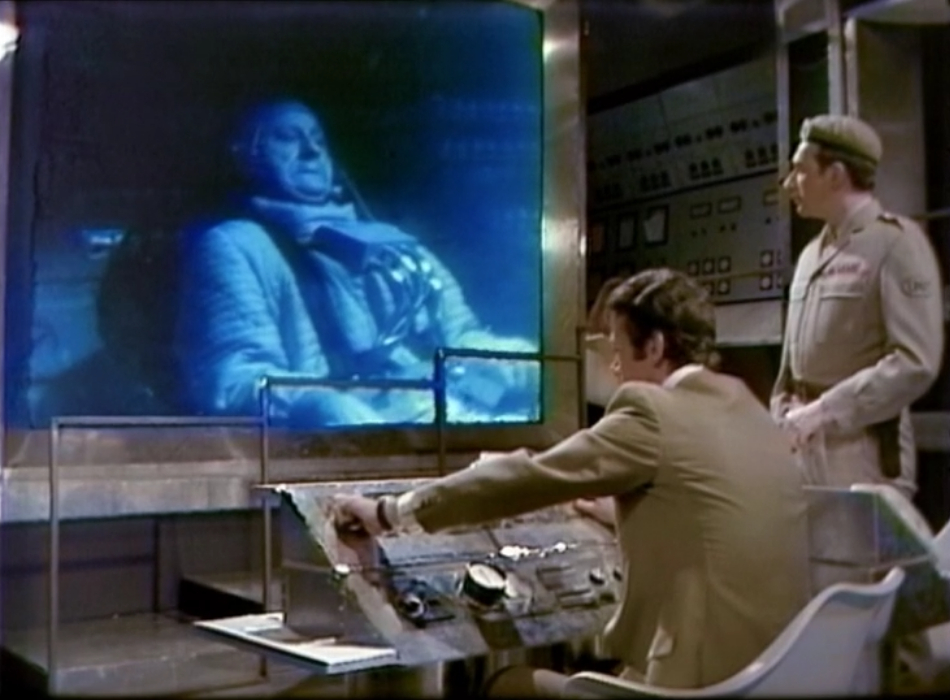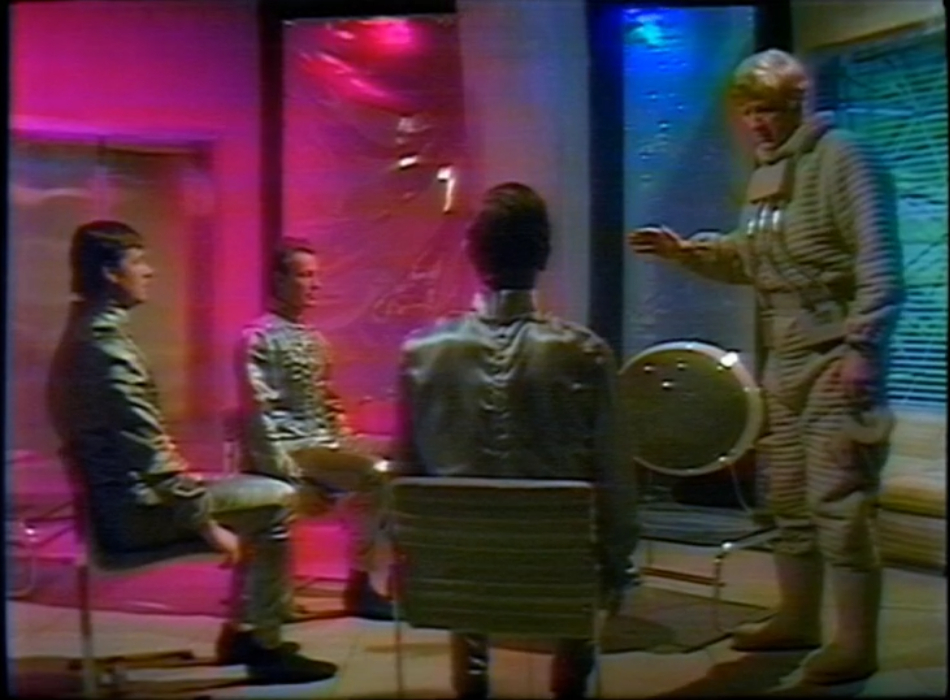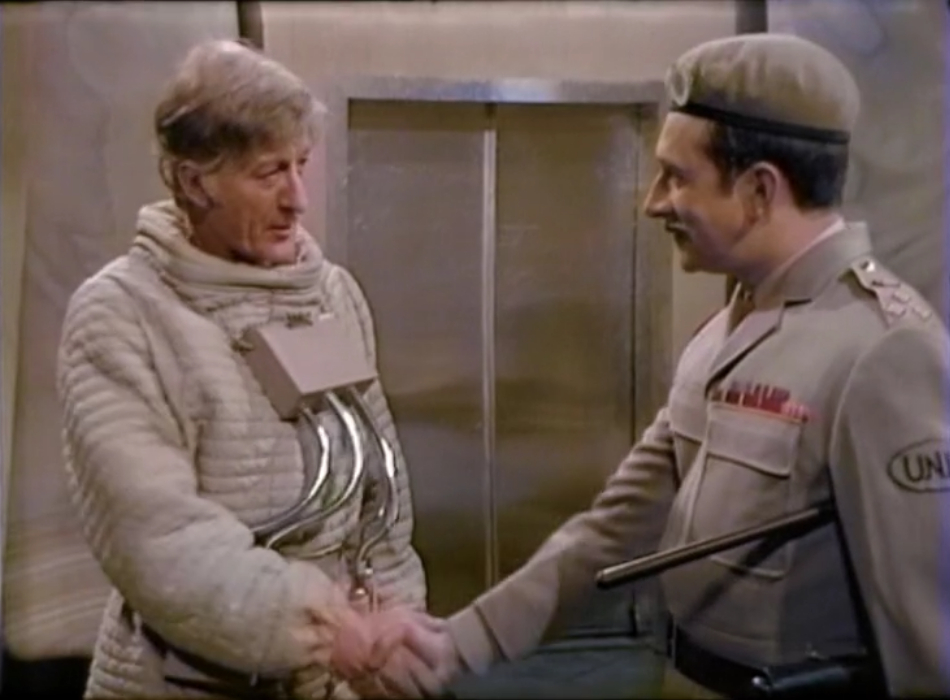
By Jessica Holmes
Have you ever been on a rollercoaster just to have it break down halfway through? That’s what this story is like. It was so close. It was so, so close to being a genuinely excellent serial. But tripping just before the finish line, this month’s story just comes out as ‘pretty good’. Let’s try and find out what went wrong in “The Ambassadors Of Death”.

Excuse me, waiter? There's some plutonium in my soup.
In Case You Missed It
We last left off with the Doctor finding Quinlan dead, unaware that his assassin is still in the room. With the arrival of the Brigadier, the spaceman forgoes the chance to kill the Doctor, making its escape. It’s not as if anyone could stop it.
The Doctor has a feeling these creatures are being used for something. Perhaps someone wants him to think they’re alien invaders, but he suspects the truth may be more complicated.
On the alien assassin’s return to the lab, a horrified Liz persuades Lennox to escape, whereupon he heads straight for the Space Centre and gets the soldiers to put him in a cell for his own protection. While waiting to see the Brigadier, someone nicely brings him some lunch. On lifting the lid however, he finds that clearly they’ve not taken his dietary requirements into account, as instead of a ham butty there’s a nice hot radioactive isotope. He doesn’t make it to his meeting with the Brigadier.

Not your best angle, Jon.
Reegan meanwhile is on a mission to stop the Doctor getting to space. As the Doctor waits impatiently on the launchpad for the Space Centre to finish fuelling his rocket, Reegan breaks into the fuel control area, sabotaging the fuel injection. The rocket makes it off the launchpad, but with too much force, the Doctor struggling to remain conscious despite his more robust physiology. Regaining control just before the rocket ends up flung out of Earth’s gravity and into a solar orbit (one of these days I am going to have to sit down with the writers of Doctor Who and draw them a diagram of the scale of space), the Doctor links up with the orbiting recovery capsule. But something is approaching. Something much, much bigger. It’s an alien spacecraft big enough to swallow the linked space capsules whole. [Shades of You Only Live Twice (ed.)]
On board, the Doctor finds the astronauts alive, well, and watching the match on telly. Well, that’s what they think they’re doing, anyway. They’re also under the impression that they’re back on Earth undergoing extended quarantine.

Anything good on?
This is for their own good, the aliens explain to the Doctor, to reduce psychological distress. It turns out the aliens don’t bear the astronauts themselves any ill will, but they are running out of patience with Earth. When will their ambassadors return?
This is of course news to the Doctor. Apparently some Earth authority agreed to host a trio of ambassadors, who have now vanished into the ether. Unless Earth gives them back, the aliens will be forced to escalate. Don’t worry, they don’t plan on doing anything to the astronauts. No, they’re just going to blow up the planet.
Of course, why take any intermediary steps?
Assuring them that this is all just a misunderstanding, the Doctor asks to back to Earth and clear things up. The aliens agree, and return him to his craft, holding the astronauts as collateral.
On Earth, Carrington’s paranoia towards the aliens continues to worsen, as he does everything in his power to get the UN to agree to throw a bunch of nukes at the alien spaceship. Cornish thinks he’s simply gone mad, but the Brigadier guesses there might be more to his ‘madness’ than meets the eye. It’s not that he agrees with him, but he thinks the General might know more about these aliens than he’s letting on.

At this point it's a toss-up between the Brig and Cornish for who snaps and punches Carrington first.
Because UNIT apparently did not learn a single lesson from Reegan’s sabotage of the fuel injection, Reegan manages to swan back into the Space Centre once again to sabotage the Doctor’s decontamination unit. When the Doctor stops responding to the Brigadier’s communications, the Brig orders the base sealed—moments too late, as Reegan speeds the unconscious Doctor back to his bunker.
Relieved to see Liz alive and well, the Doctor is fascinated to see the alien ambassadors, remarking that with the right resources, he could build a much more sophisticated communication device to talk to them. Reegan’s happy to accommodate him and recruit him into his own criminal enterprise, but then who should show up but General Carrington?
Well, well, well. If it isn’t the guy who was obviously the villain all along. Quelle surprise. He and Quinlan cooked up a cover story to justify kidnapping the astronauts, then he had Reegan kidnap the astronauts AGAIN when UNIT came too close to finding them, then killed Quinlan before he could reveal the truth.
And all of this he considers his “moral duty”.

Do you mind? I'm busy.
His mission to Mars didn’t go entirely according to plan. He and his crew encountered the aliens there, and they killed him with a touch, not realising how vulnerable humans are to ionising radiation. But since that first interaction, Carrington’s managed to convince himself that the aliens are out to invade the entire galaxy, and it’s only a matter of time before they attack Earth.
Humanity must strike first if they want to survive.
So says Carrington, anyway.
He lured the ambassadors to Earth with the intention of turning the world against them. Underneath all the complicated conspiracy to keep things secret, his plan is actually quite simple: use them to attack some government facilities, then reveal them to the public while spinning a yarn about the aliens attacking with the aid of human collaborators. And also the Doctor. Might as well kill two birds with one stone, I suppose.

His plan gets even easier when he takes one of the aliens to the space centre for their moment in the spotlight, as the alien spacecraft picks the worst possible moment to broadcast their ultimatum to the world. In plain English. And it’s not thanks to the Doctor’s device that the humans can now understand them, oh no. They spoke to him in English on board their spacecraft.
Hold on a mo.
The supposed crux of the story is that this is all a misunderstanding and a case of humans jumping to conclusions about aliens that don’t—and can’t—communicate as we do, but we find that it’s simply not the case. They can, but just won’t, until it’s time for their final ultimatum.
Wouldn’t it be interesting if it turned out that, like Carrington, they were also attempting to contrive some justification for a pre-emptive strike?
Unfortunately, exploration of that idea would require the narrative to actually be interested in the alien creatures the plot hinges on.

When the Brigadier objects to Carrington’s assertion that the Doctor has been collaborating with the aliens, Carrington has him arrested. But you’ll need more than two men to take down Lethbridge-Stewart. Under a hail of bullets, he steals a staff car and flees the Space Centre.
On regrouping with the few UNIT men that Carrington hasn’t managed to detain, he learns that they’ve managed to triangulate the Doctor’s position from the SOS signal he’s been secretly using the translation device to broadcast. The next task is working out how to actually get there, as all of UNIT’s jeeps are at the Space Centre, and the car the Brig “borrowed” is swiss cheese.
Well. There’s always Bessie.

I laughed aloud at the look on the Brig’s face when one of the young Sergeants (Benton or something?) brought it up, and laughed even harder at the sight of them all packed into the most absurd car on Britain’s roads.
Fighting his way into the bunker, the Brig finds a not-entirely-grateful Doctor who snippily asks what kept him so long.
It’s funny, when he’s around Liz he’s a total gent, but around literally anyone else this Doctor is probably best described as ‘difficult’. I’m getting notes of early Hartnell before he learned to embrace the power of friendship.

Now is the time to take the fight to Carrington, but they don’t exactly have firepower on their side. Or do they? Reegan, having accepted defeat with grace, suggests that they use the spacemen. It’s a pity he’s morally bankrupt; he strikes me as probably a very effective UNIT agent in another life.
I enjoy Reegan as a villain more than Carrington. He knows he’s a villain and is having a great time. There’s a certain charisma to him, unlike Carrington who I wouldn’t really like even if he wasn’t intent on starting a war. Carrington’s at least got convictions and thinks he’s doing the right thing, but I’d be a lot more sympathetic if he had the brains to go with them. I don’t know what he expects to happen after blowing up the alien ship, but I’m pretty sure it wouldn’t end well for Earth.

The aliens agree to help the Doctor break back into the space centre, and under his command they walk in without even getting into a fight. Entering the Space Centre moments before the televised revelation of the aliens can proceed, the Brig arrests Carrington and orders the release of his alien captive.
Carrington puts up no resistance to the combined might of UNIT and the aliens (some planetary defender he turned out to be), and the serial just sort of…stops.
The Doctor tells Cornish the the astronauts are fine and tells him to swap them for the alien ambassadors, leaving Liz with him to assist in translation, then swans off. That’s it.

What Do You Mean, That’s It?!
Talk about an abrupt denouement.
To me, a well-written ending needs both an exciting climax and a satisfying conclusion. You can’t have one without the other. There’s plenty of excitement but you’re left with a sense of ‘Is that it?’
Yes, the spy plot gets wrapped up neatly, but what about the ambassadors? You know, the beings the serial is named for? Surely we could have made time in the script for one last chat with them.
This serial is supposedly about the importance of communication. The entire conflict rests on humanity’s inability to talk to the aliens. And yet at the end of it all, when they finally have both the means and the opportunity, everyone, including the writer, loses interest in what they have to say.

On the one hand, it does make sense thematically that a fairly military-heavy serial like this gets wrapped up in a second once everyone starts communicating. But as I said, that would require actual interest in the theme of communication.
The narrative is telling me that communication and diplomacy are ultimately more valuable than underhanded tactics and firefights, but the way the story is structured shows me the opposite. Much of the screen time is devoted to spy high jinks and military stunt sequences, with the more alien-focused scenes sprinkled lightly through and making for rather dry viewing. I don’t think it’s a problem that would be fixed quite as easily as fiddling with the ratio of action-heavy scenes to dialogue-heavy scenes. In the hands of a stronger dialogue writer it might be workable but as it stands, though the dialogue isn’t at all bad, it’s pretty nondescript.
None of this should be taken to mean I didn’t like the spy stuff or the action scenes. They’re fun! I just wish the same amount of care had been given to the core theme.

Final Thoughts
It’s at least encouraging that UNIT and the Brigadier seem to have learned their lesson from the previous serial, consistently supporting the Doctor as he attempts to uncover the truth and backing him up against the war-mongering Carrington.
For all his sniping and general irritability with him, I do think the Doctor is glad to have the Brigadier on his side. I’m still uncertain about him, but his characterisation here feels more in line with previous stories before the Silurians.
Despite the strong start, Ambassadors Of Death starts faltering in the middle and foregoes a satisfying ending in favour of the Brigadier punching a baddie off a cliff. That said, it is still fun. I can’t say I didn’t enjoy it on that level at least. But fun isn’t enough to elevate a story from ‘pretty good’ to ‘great’. It all rests on the aliens, and the aliens aren’t up to the task.
They’re not characters. They exist within this plot only to be misunderstood, kidnapped and exploited, treated as a monolith, none of them having any discernible personality. They’re a glorified MacGuffin, and it’s a shame, because in concept there’s so much interesting potential with them. What happens next for humanity and the aliens? Did Carrington blow our chances of relations with another world, or did the actions of the Doctor, UNIT and the Space Centre help to smooth things over? Do the ambassadors even have an opinion at all on all this?
Unfortunately, this serial doesn’t seem interested in the answer, or indeed in asking the question.
3 out of 5 stars for The Ambassadors Of Death.
[New to the Journey? Read this for a brief introduction!]



